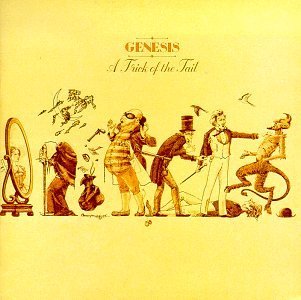 Many people see Peter Gabriel as the creative mind behind Genesis, but a few listens to A Trick of the Tale or Wind & Wuthering may quickly dispel that myth for many. This is an oft-overlooked period in Genesis musical history. The band was seemingly searching or grasping for a new identity in the wake of Peter Gabriel’s departure.
Many people see Peter Gabriel as the creative mind behind Genesis, but a few listens to A Trick of the Tale or Wind & Wuthering may quickly dispel that myth for many. This is an oft-overlooked period in Genesis musical history. The band was seemingly searching or grasping for a new identity in the wake of Peter Gabriel’s departure.Dance of the Volcano is the first evidence that despite the departure of a very creative and pivotal member of their band, Genesis was still on solid footing. One might expect Genesis to be struggling, or that this album might be weaker than its predecessors in light of Gabriel’s absence. In which case, one would be quite wrong in each case. From the opening notes and through the entire CD, Genesis displays a self-assurance that is quite conspicuous in its presence.
Indeed, Phil Collins steps up from behind his drum kit to handle lead vocals with a level of confidence that betrays his relative vocal inexperience. This isn’t a slam on Peter Gabriel, so much as a testament to the band’s adaptability and growth.
Much of their material from this era is lush and full that it might more accurately be described as “soundscapes” than as mere “music.” These aren’t just musicians, they’re artists, your eardrums are their canvas and throughout songs like Entangled, Ripples, and Los Endos they paint vivid and lush musical paintings.
Their continued musical growth is largely attributable to their extremely talented and oft-overlooked guitarist, Steve Hackett. Hackett is a musical chameleon, both as a guitarist and a songwriter. And many, myself included, would argue that Hackett, moreso than Peter Gabriel was the driving creative force behind Genesis. They didn’t truly come into their own until he joined the group in 1973, just in time for their Nursery Cryme album and they maintained a certain level of musical creativity and excellence until his departure following the Wind & Wuthering album.
Another facet of Hackett’s talent was his ability to draw the best out of messrs. Collins, Banks, and Rutherford.
Some may scoff, some may chortle, but songs like Ripples and Los Endos remain some of the best in Genesis long and accomplished canon—both easily stand up to classics from the Peter Gabriel era such as Watcher of the Skies, Supper’s Ready, Firth of Fifth, and Cinema Show.
In lesser bands, the mere level of talent of the individual members of the band led to personality clashes and a certain level of one-upmanship. What made Genesis work so well in the “Hackett-era” was a certain level of musical respect, allowing each member their chance to “shine” and allowing their talents compliment, rather than overshadow that of their bandmates.
While their Foxtrot and Selling England By the Pound albums are considered classics. One would be remiss to leave A Trick of the Tail off that list as it truly is a continuation of meeting the bar set very high by those albums. While not superior to the Peter Gabriel era material, it is certainly equal to it.
2 comments:
You already know that I largely agree with your points. This is one of my 25 favorite albums of all time. Here are a few musings ...
1. PC did so well taking over vox from PG not only because he is a decent singer who had some experience singing lead during the previous five years (on Genesis albums and on Steve Hackett's first solo album) but also because he learned PG's style. At least one observer at the time said that Phil sounded more like Peter than Peter did. And I know people who have heard PG-led Genesis albums for the first time and thought that it was Phil singing because they were more familiar with Phil's voice and thought Peter was copying Phil!
2. "Dance of the Volcano" is indeed an excellent opening. And I count "Entangled," "Mad Man Moon," and "Los Endos" (the latter with an intro derived from "It's Yourself," a track unreleased until the Archive box sets) among the best tracks of the post-PG years. Even "Squonk" is a good tune, although I think it's opening is strong mostly as a follow-on to the emotional ending of "Entangled." "Ripples" has always left me wanting more ... I guess I feel that it's one of those songs that could have been more epic, a la "Firth of Fifth," but they cut it short.
3. The Hackett years weren't all harmony and teamwork. Everyone felt some degree of discomfort, an understandable side-effect of having toomany creative people in one outfit. Tony Banks, for example, always hated "After the Ordeal" from Selling England by the Pound, and Steve tried in vain to get his songs onto Genesis albums for years. The other band members' refusal to put "Please Don't Touch" onto a Genesis album contributed to Steve's departure from the band. (Thankfully, that fun instrumental track showed up on Steve's first post-Genesis solo album.)
Nice review!
-- david
Oh yes, and I forgot to add that I have finally added a link to your blog to mine.
Cheers!
-- david
Post a Comment